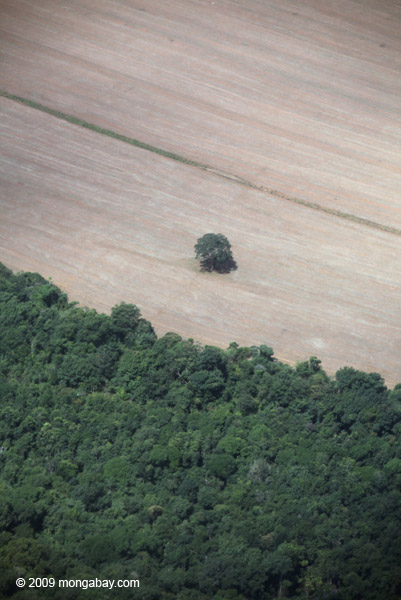Group responsible for crimes worth more than $220 million, could face decades in prison
A criminal organization involved in the illicit deforestation of large portions of Brazil’s forests has been stopped. At least six members of the organization, described by authorities as the “the greatest destroyers of the Brazilian Amazon rainforest,” have been arrested as of Aug. 28, with warrants issued for others.
Police apprehended five men and one woman in the Brazilian state of Para, with a total of 14 warrants issued across four states. The warrants and arrests came as the result of a joint investigation called “Operation Chestnut” between the Brazilian Institute of environment and Renewable Natural Resources (IBAMA), the Federal Police, the IRS, and federal prosecutors. The operation’s moniker was inspired by a species of protected chestnut tree that is considered a symbol of the Amazon.
 A lone Brazil nut tree sits on the edge of a cleared forest in Mato Grosso, Brazil. Photo by Rhett A. Butler. |
The organization is accused of invading, logging, and burning areas of public land, then selling them as farming and grazing allotments. All told, their crimes are worth more than $220 million.
The group even targeted national parks, including Jimanxim National Park in western Para. According to data from Global Forest Watch, Jimanxim lost approximately 9,000 hectares of – or 1.3 percent – of its forests between 2001 and 2013. It is as-yet unknown how much of this loss is attributable to the organization in question. The park is home to the bare-eyed antibird (Rhegmatorhina gymnops), which has a very small range and is listed by the IUCN as Vulnerable due to habitat loss.
The organization’s members will be charged with invasion of public lands, theft, tax evasion, environmental crimes, forgery, conspiracy, and money laundering. If convicted, the sentence for all charges could exceed 50 years in prison – however, under Brazilian law the maximum sentence is 30 years.
Brazil has one of the highest rates of deforestation in the world. According to Global Forest Watch, the country lost more than 36 million hectares of forest between 2001 and 2013. However, the rate has decreased 80 percent since 2004 despite the Brazil’s economic growth, and the country’s leaders have pledged to reduce deforestation a further 80 percent by 2020 if supported by big business.

The organization conducted illegal clearing in national parks and forests, such as Jimanxim National Park, which overall lost 1.3 percent of its forests in just over a decade. Map courtesy of Global Forest Watch. Click to enlarge.

Satellite image of a cleared are in Jimanxim National Park. Smoke from fires is visible in the lower portion of the image. Courtesy of Global Forest Watch. Click to enlarge.
Related articles
Invasion of the lionfish: new research finds the situation may be worse than we thought

(08/27/2014) You may have recently read the controversial story on invasive lionfish research involving Dr. Zack Jud of Florida International University and a young girl named Lauren Arrington. While the issue of attribution in scientific research is crucial to the discipline, much of the media focus so far has sidestepped the real issue: what lionfish tolerance for brackish water really means for the environment.
How do we save the world’s vanishing old-growth forests?

(08/26/2014) There’s nothing in the world like a primary forest, which has never been industrially logged or cleared by humans. They are often described as cathedral-like, due to pillar-like trees and carpet-like undergrowth. Yet, the world’s primary forests—also known as old-growth forests—are falling every year, and policy-makers are not doing enough to stop it.
Norway puts $1.6B into rainforest conservation

(08/19/2014) Since 2008 Norway has been the single largest foreign donor to tropical forest conservation, putting more than 10 billion Norwegian Krone, or $1.6 billion, toward programs in several countries under its International Climate and Forest Initiative. But how effective have those funds been in actually protecting forests?
China and Europe’s outsourcing of soy production impacts the Amazon
(08/14/2014) Soy consumption in China and Europe is having significant ecological impacts in the Brazilian state of Mato Grosso, finds a study published in Environmental Research Letters.
95% of Amazon deforestation happens near roads or major rivers
(08/05/2014) 94.9 percent of deforestation in the Brazilian Amazon occurs on land less than 5 kilometers from a road or navigable river, finds a new study published in the journal Biological Conservation.
2 prize-winning journalists will report on Amazon, 2 new prizes announced

(08/01/2014) Mongabay.org’s Special Reporting Initiative (SRI) program has recently awarded two different reporting prizes to journalists to tackle these vital and complicated issues in-depth. The non-profit has also launched a call for applications to two new SRIs: The social and environmental impacts of foreign development finance in the Amazon and Food spoilage and waste in Sub-Saharan Africa.
Brazil releases video showing first contact with rainforest tribe
(07/31/2014) The Brazilian government has released footage showing ‘first contact’ with an isolated group of indigenous people in the Amazon rainforest.







